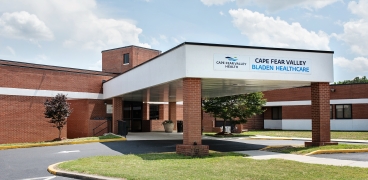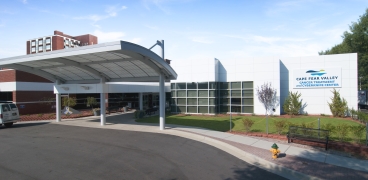At Cape Fear Valley Health, our goal is to help you make your breast health a top priority. We provide mammograms to detect breast cancer or other breast problems earlier, when they’re easier to treat.
What Is a Mammogram?
A mammogram is a low-dose X-ray of your breasts to screen for or diagnose breast cancer. Our expert radiologists examine these images for changes or irregularities in your breast tissue.
When Should I Get a Mammogram?
Starting at 40, we recommend getting a mammogram every year. Your doctor may recommend that you get a mammogram before the age of 40 if:
- You have a family history of breast cancer.
- You have inherited a mutation in the BRCA1 or BRCA2 gene, which is linked to breast cancer.
Our Approach to Mammograms
At Cape Fear Valley Health, we offer both screening and diagnostic mammograms:
- A screening mammogram is a preventive exam that can detect breast cancer before you have any symptoms. Your doctor may recommend this type starting at age 40 or earlier depending on your health history and/or family history.
- A diagnostic mammogram can help investigate signs or symptoms of breast cancer. You may need a diagnostic mammogram if you have symptoms of breast cancer. This can include a breast lump discovered during a self breast exam, an abnormal mammogram or breast pain.
Advanced 3D Mammogram Technology
While 2D digital mammograms have been the gold standard of breast imaging, there are limitations. 2D mammograms can’t always detect cancers in dense breast tissue — and about half of all women have dense breasts.
At Cape Fear Valley Health, we offer 3D mammograms, also known as tomosynthesis. 3D mammograms take multiple images of the breast from different angles. These images can then provide a clear view of the breast and overlapping dense breast tissue.
The benefits of 3D mammograms include:
- A lower risk of getting a callback from your mammogram.
- Detection of a wider range of breast cancers.
- Detection of breast cancers in dense breast tissue.
Benefits of a Mammogram
Research shows that mammograms have helped reduce breast cancer deaths in the United States by nearly 40%.
Mammograms can identify changes in your breasts up to two years before you can feel them in a self breast exam. That means, they often can detect early-stage breast cancers, which are typically easier to treat.
Additionally, by catching breast cancer earlier, you may have more — and often less aggressive — treatment options. For instance, with early-stage breast cancer, you may need a lumpectomy to remove the cancer, rather than a full mastectomy. Or you may be able to avoid chemotherapy.
Preparing for Your Mammogram
Here are some tips to help you prepare for your mammogram at Cape Fear Valley Health:
- Try not to schedule your mammogram the week before or during your period when your breasts may be tender or sore.
- Make sure to bring past mammogram images, biopsy reports or other breast images you’ve had at other locations.
- Avoid using deodorant, antiperspirant or lotions under your arms, or on or under your breasts.
What to Expect During Your Mammogram
This is what you can expect during your mammogram at Cape Fear Valley Health:
- Your technologist will position your breasts, one at a time, between two plates of the mammogram machine.
- These plates will slowly compress or flatten your breasts to get a quality image of your breast tissue. (You may experience mild discomfort or pain during these compressions, which last about 30 seconds.)
- Your technologist will ask you to hold your breath for just a few seconds. Then, the machine will take X-rays of your breasts.
- Your technologist will likely reposition you a couple times to ensure they are getting all of the images needed.
- Your screening mammogram will take about 30 minutes.
What to Expect After Your Mammogram
When you complete your mammogram, you will go home while we review your images. One of our experienced breast radiologists will examine your mammogram and also compare it to past mammograms, if available.
They’ll look for any irregularities in your breasts, including calcifications (small white spots) or masses (abnormal-shaped breast tissue).
We will send a letter or call you within X days with your results. If you have an abnormal mammogram, you may get called back for additional screening. This could include:
- A diagnostic mammogram
- Breast ultrasound
- Breast MRI
We can quickly arrange for any additional screening you may need.
An abnormal mammogram does not necessarily mean you have breast cancer. Additional screening will allow us to investigate any irregularities and determine next steps.
The breast cancer survival rate was much different 20 or 30 years ago. The advent of screening mammography and 3D mammography has been a game-changer [for survival]. That’s why we really encourage woman to go get your mammogram and don’t miss a year … These early breast cancers are very curable.




